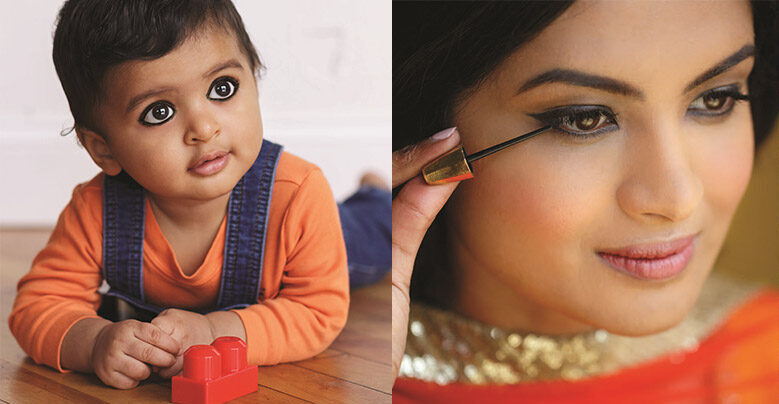In April 2024, a global Pure Earth study, “Rapid Market Screening to assess lead concentrations in consumer products across 25 low- and middle-income countries” published in Scientific Reports revealed elevated levels of lead in 12% of cosmetic samples. Two traditional kohl eyeliners from Pakistan had the highest lead concentrations— 290,000 ppm and 320,000 ppm (equivalent to 29 and 32% lead, respectively), which far exceed the FDA’s threshold of 10 ppm for safe cosmetics. In light of these alarming findings, the Pure Earth research team began an effort to collect and test additional eyeliner products offered through online retailers.
Kohl, also known as kajal, surma, or tiro, is a prevalent cosmetic product in South Asia, North Africa, and the Middle East due to its aesthetic appeal, roots in Islamic text, and purported therapeutic effect on the eyes. In addition, kohl eyeliner has become increasingly popular on social media platforms like TikTok in the U.S. Traditionally, the powder or cream formula is applied to the eyelid margin and remains on the skin overnight. This allows lead to enter the body via subdermal absorption through the eyes, eye-rubbing, and hand-to-mouth contact. Kohl has been linked to lead poisoning in children and adults, and is illegal in the U.S. due to its heavy metal content. Despite this, these products may be imported through individual online retailers.

To begin this screening effort, our researchers surveyed U.S. stores and online platforms (primarily eBay, Etsy, Amazon, and TikTok Shop) to identify products explicitly labeled as kohl, kajal, surma, or tiro. We selected a representative sample of 60 kohl products across a range of formulations, colors, manufacturing regions, and intended users. All 60 samples were screened using an XRF analyzer, and 20 samples were lab-tested for lead using ICP-MS.
The screening yielded troubling results: 53% of all samples had a lead concentration equal to or greater than the U.S. reference level of 10 ppm. Among samples from manufacturers in low-and middle-income countries, this proportion rose to 65%, with some samples containing as much as 290,000 ppm lead, or 29% lead. 30% of all samples had a lead concentration greater than 100 ppm, and 25% of all samples had a lead concentration above 1000 ppm.
Trends also emerged among specific categories. Black kohl — which appears to be the most popular — demonstrated significantly elevated lead levels compared to samples of other colors: nearly 60% of black samples exceeded the reference level, compared to 14% of non-black samples. Products found to have the highest levels of lead were from Saudi Arabia, India, and Pakistan, while those with the lowest came from the U.S. and E.U. There was no significant difference between lead levels in samples that were labeled “lead-free” and those that were not. In fact, 62% of samples that were labeled “lead-free” were contaminated with lead.

One product specifically marketed for use on babies was found to be lead-contaminated. This is particularly dangerous because hand-to-mouth activity puts children at greater risk of lead exposure, which can cause delayed development, impaired academic performance, and permanent brain damage. Further research is needed to determine the amount of lead ingested by adult kohl users and the consequent effect on blood lead levels.
We hypothesize that these lead-contaminated products are entering the U.S. market due limited regulations for online retailers. Federally, the U.S. FDA monitors and regulates the level of lead in some consumer products, including domestically produced cosmetics, and issues Import Alerts to stop hazardous consumer products at the U.S. borders. However, these regulations are difficult to apply to items purchased through individual online retailers, like those who use eBay and Etsy.
The New York City Department of Health and Mental Hygiene has found challenges in using health warnings to prevent the use of lead-contaminated kohl due to deeply ingrained and persistent cultural practices. In addition, many users of kohl eyeliner may not realize that it is lead-contaminated.
In response to our findings, Pure Earth reached out to 15 vendors of contaminated kohl (including individual re-sellers and some small-scale and U.S.-based manufacturers). In each correspondence, we explained the risks of lead exposure and urged vendors to cease selling the contaminated product and to notify customers who had already purchased it about health risks. Our forthcoming final study will analyze the receptiveness of vendors to this information about health concerns and their willingness to take appropriate action to protect consumers’ safety.
Stronger enforcement is needed to prevent lead-contaminated kohl eyeliner from being available in the U.S. In addition, stricter regulations are essential to ban the sale and production of lead-contaminated kohl in its countries of origin and to ensure the products are reformulated to be lead-free.
The FDA urges consumers to stop using lead-contaminated kohl eyeliner products immediately, especially children, and to ask a healthcare provider to test children as well as pregnant or nursing women for lead poisoning if they have used the product.
The team is continuing to collect products and test, and is working toward submitting the results to a reviewed journal for publication. If you’d like to learn more about our findings, please contact research@pureearth.org.





